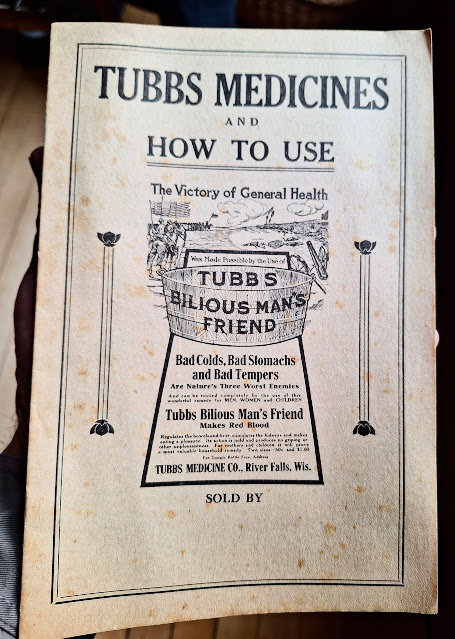Continuing my survey of 19th century patent medicine companies from Western Wisconsin. Why? I suppose the answer could either be Why Not? Or, who else is gonna do it?
Today we visit the Tubbs Medicine Company of River Falls, Wisconsin.
Yes, their logo was a wooden tub and their flagship product Bilious Man's Friend. Notice that it is touted for Bad Colds, Bad Stomachs and Bad Tempers. With that combination a man might not have many actual friends.
Thomas Emerson Tubbs was born in Vermont in 1836. As a young man he "Went West", driving a team out to the frontier town of Prescott Wisconsin in 1854. He liked what he saw and staked out a claim in an area called Glass Valley. His first business was a small wagon and sled manufacturing business which he moved to River Falls in 1866.
Tubbs was a very enterprising young man. In addition to the wagon and sled trade he ran eleven different insurance companies and also peddled, "Babcock Fire Extinguishers", fire and burglar proof safes and a complete line of school, church and farm bells.
Some time in the early 1870s he added patent medicines to his portfolio. Supposedly he brought with him from Vermont certain formulas including an "Elixir of Life".
In 1876 the Tubbs Block, from which he ran his many enterprises burned to the ground. Reappraising his situation Tubbs decided to focus on the medicine business, although he still ran his various insurance agencies. The product line was the usual array of nostrums for Man and Beast.
Tubbs proved to be a good businessman. He made distribution arrangements with a major Minnesota wholesaler and also recruited a local traveling sales force for closer to home. He made a wide array of medicines....and a fair bit of money.
T.E. Tubbs died in 1894, handing the business off to his son Willard. The good times kept rolling on. Bottles of syrups and elixirs, advertising almanacs in many languages, pills and plasters, went out the door in their thousands. Many have survived as you'll see below.
Eventually the Pure Food and Drug Act of 1906 started to put a crimp in things. No longer could you keep the ingredients secret. Or make outlandish claims for curing human ills. Veterinary products remained fairly unregulated.
Willard passed on in turn in 1931. Around that time the company was sold to outside interests and does not seem to have survived for long thereafter.
The commonest Tubbs items you run across are these little guys. TUBBS is embossed on each side. They have many different labels.
The side panels tout their flagship brands, one of which was Bilious Man's Friend.
I actually have a bottle of the stuff. Unlike the 1900 era bottle above, this goes back to the 1880s at least in terms of bottle style. The label is fading and there might not be many more examples in existence, so I'll show as much as I can.
No post 1906 hedging here. IT CURES a wide array of problems. Costiveness, Heart-Burn, Nervous Disorders, Nightmares, Scrofula. Like most such patent medicines it had a good wallop of alcohol in it. Probably not good for the Heart-Burn but it would at least make you worry less about all the other stuff.
Back panel.
About those almanacs. This one has a blank space at the bottom. Usually the druggist or merchant who sold the medicines would stamp their name there. The military scene depicting the Victory of General Health is generic. Vaguely Civil War in its imagery but more contemporary with the Spanish American conflict.
Chock full of pictures of suffering people.
As such things are figured, the TUBBS company was small potatoes by the standards of the great patent medicine millionaires like Dr. Kilmer. But it was an enduring enterprise that did a profitable trade for roughly six decades. Not a bad track record.










No comments:
Post a Comment